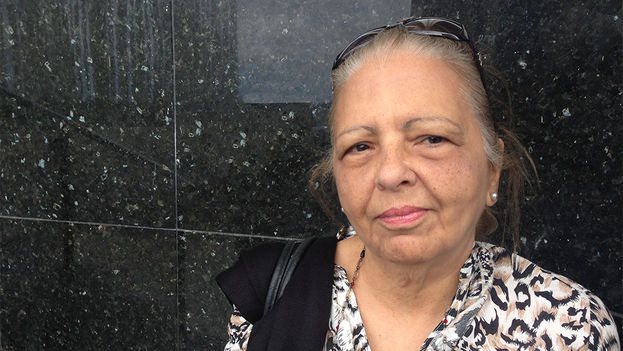
14ymedio, Lilianne Ruiz, Havana, 28 April 2016 — Martha Beatriz Roque has returned from Miami after receiving a permit from the Cuban government in late February, which authorized her to leave the country one time. The activist was one of the seven former prisoners of the Black Spring of 2003 who benefited from this permit. She returns with a certain pessimism and a critical impression of the state of the Cuban opposition.
Lilianne Ruiz. You returned from abroad after permission from the Cuban government, which allowed you to make only one trip. What impressions did you bring back from your stay outside the country?
Martha Beatriz Roque. I come back with a tremendous pain in my heart about what I have seen there. In Miami there is the historic exile, who love their country, their fatherland, who talk about democracy, who think about Cuba constantly and who have a great nostalgia for the island, but this historic exile, unfortunately, is getting old and some of its members have died.
However, many people who are coming to Miami through different countries, including now through Costa Rica, Ecuador and Panama, are turning their backs on Cuba, they even want to forget that they are Cubans. These are people who are a part of a social fabric here that is broken, who have no ethics, no formal education and they are contaminating Miami.
LR. What do you think has been the outcome of Barack Obama’s visit to Cuba?
MBR. Obama has his agenda and within it is defending the interests of American citizens, as is natural, because that is his country. He has made it clear that the problems of Cuba have to be solved by Cubans and that is important. The people had a great lesson with Obama’s visit: for the people it has meant hope, which the Communist Party Congress subsequently tried to annihilate.
LR. And the opposition?
MBR. In Cuba there are opponents, but an opposition, as such, does not exist. An opposition exists in Venezuela, because it has been capable of uniting despite its disagreements. We are not capable of something like that yet. Here the unity lasts seconds.
LR. Did the 7th Congress of the Communist Party frustrate you, or were you were expecting something like what happened?
MBR. The Party Congress was going to be postponed to another date but it was held to try to counter what Obama said to the Cuban people, and because of this they didn’t have any finished [guiding] document. Some said, after the Congress was over, “We were right, Obama has achieved nothing.” Others say that the Congress was a way of demonstrating the failure of what Obama is doing, but I would not say that. Much less do I think it is a failure, because there are things that have been accelerated with Obama’s visit.
LR. Like what?
MBR. In the specific case of the eleven members of us from the [Black Spring] group of 75 who remain in Cuba, we were not allowed to leave the country and, at least in this moment, they allowed us one trip abroad. There have been solutions to some problems that you couldn’t say are changes, without the reestablishment of rights. This has to be seen as something satisfactory, not as something negative. In the not so distant future other solutions will have to come, because the economic, social and political situation of the country is unbearable.
LR. Will it be the self-employed who change Cuba?
MBR. The Cuban regime will not allow any self-employed to export, because that, they will say, is reserved for the businesses of the Ministry of Foreign Trade. The United States government is trying to have direct relationships with the self-employed, but that is not going to be allowed. Right now, when some self-employed turn their faces just slightly to the north, they’re going to cut off those businesses they’re going to stop everything.
LR. Can access to the internet help make the changes occur?
MBR. The regime does not allow it because they know that the internet is a source of knowledge, of the transmission of news and possibilities.
LR. What is the Cuban opposition lacking to be able to call forth the people?
MBR. First of all, it lacks leadership. Unfortunately, here everyone wants to be a leader, no one wants to be in the line, everyone wants to be at the head of it. It also lacks the exile,, which is capable of manufacturing a leader and putting forward a project with resources, but this does not solve anything.
LR. Do you see any chance for the opposition to influence the constitutional referendum announced by the government?
MBR. The opposition has not matured, it is still the same, generating documents, projecting itself abroad, meeting abroad, telling people what they have to do. But if the opposition doesn’t take advantage of this moment to work jointly with the people, it’s simple, nothing is going to happen. If they don’t work with the people, if they don’t raise awareness among the people, what does it matter that they go to meet the Pope in Rome, it’s all the same, it is simply not going to solve anything.
